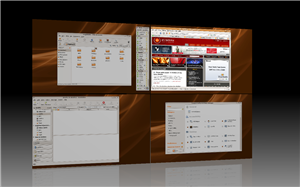Ubuntu founder Mark Shuttleworth announced Wednesday that his company, Canonical, will hire professional designers and interaction experts to improve the usability of the Linux desktop software ecosystem. They will work closely with upstream developers to bring a better experience to users of the open source operating system.
The charismatic frontman of the Ubuntu phenomenon made headlines for his keynote at OSCON earlier this year when he called for the open source software community to take on Apple and Microsoft and turn Linux into a platform that delivers superior usability and attractiveness. He echoed that sentiment on Monday when he announced plans for the upcoming Ubuntu 9.04 release (Jaunty Jackalope) and proclaimed that Ubuntu is ready to win in the consumer market and could be shipped on millions of devices in the coming year.
Shuttleworth is now backing up his tough talk with fat wads of cash and taking the first steps toward formulating a real plan for achieving his goals. In his announcement, he emphasizes the importance of making usability enhancement a community-driven effort. He acknowledges that improving usability across the entire scope of the desktop software ecosystem is a daunting challenge, but he believes that the collaborative spirit of the open software development model can get the job done.
"[I] have a deep belief in the power of the free software process to solve seemingly intractable problems, especially in the long tail. If we articulate a comprehensive design ethic, a next-generation HIG, we can harness the wisdom of crowds to find corner cases and inconsistencies across a much broader portfolio of applications than one person or company could do alone," he wrote in a blog entry. "That's why it's so important to me that Canonical's design and user experience team also participate in upstream projects across the board."
Another way in which Shuttleworth's announcement is noteworthy is that it reflects an expansion of Canonical's commitment to contribute back to the open source software community. Although Ubuntu is widely recognized as the front-runner in the desktop Linux market, Canonical itself is still a relatively small company. Historically, Canonical has not had the resources to make big upstream code contributions on the same scale as other players like Red Hat and Novell.
 This has been a source of some bitterness and controversy in the open source software community. In addition to focusing on the importance of working with upstream developers, Shuttleworth also defends Canonical's track record and past contributions while vowing to bring resources and funding to contribute to development of Xorg and other essential parts of the Linux desktop.
This has been a source of some bitterness and controversy in the open source software community. In addition to focusing on the importance of working with upstream developers, Shuttleworth also defends Canonical's track record and past contributions while vowing to bring resources and funding to contribute to development of Xorg and other essential parts of the Linux desktop.
"We focus most of our effort on integration. Our competitors turn that into 'Canonical doesn't contribute' but it's more accurate to say we measure our contribution in the effectiveness with which we get the latest stable work of upstream, with security maintenance, to the widest possible audience for testing and love. To my mind, that's a huge contribution," he wrote. "Increasingly, though, Canonical is in a position to drive real change in the software that is part of Ubuntu. [...] So we are also hiring a team who will work on X, OpenGL, Gtk, Qt, GNOME and KDE, with a view to doing some of the heavy lifting required to turn those desktop experience ideas into reality."
The strategy that is starting to take shape looks very sound. Canonical is aiming to approach desktop usability from two directions: the company will work to improve the bottom layer of the desktop stack in order to facilitate more innovation in the top layers, and will also bring in usability experts and designers to guide user interface development and make it beautiful. Ubuntu is known for its top-notch usability, so this seems like a good place for Canonical to start contributing. It may not be enough to beat Apple, but it's a step in the right direction.
reader comments